First monuments of St. Petersburg
5 photo with description06.11.2019 04:51
06.11.2019 04:51
Andrey Panevin

First monument in St. Petersburg, or rather, the very first monument to man, was, of course, erected in honor of Peter I - the founder of the city.
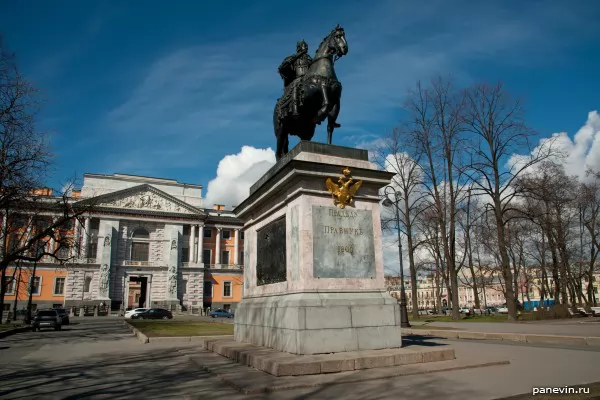
Monument to Peter I in front of the Engineering Castle. The inscription on the pedestal: Great-grandfather Great-grandson. The only equestrian statue in the Baroque style in the city (and, perhaps, in Russia). On the sides of the pedestal are the two most significant Peter's victories - Gangut and Poltava.
The model of the monument was made by the sculptor B.K. Rastrelli during the life of Peter I, however, its casting was completed only in 1745 - 1747. The monument was erected only after half a century - in 1800, which is why such an inscription on the pedestal.
The second is also in honor of Peter I and everyone knows him. This is the “Bronze Horseman” (the poetic name coined by Pushkin).
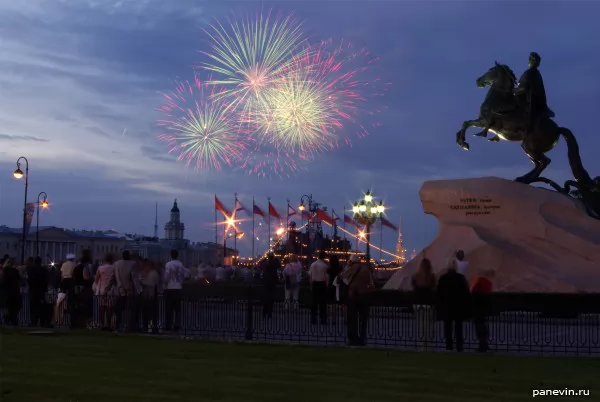
The monument to Peter I on Senate Square was erected by decree of Catherine II. Sculptors E.-M. Falcone, M.-A. Collot, F. G. Gordeev; architect J. M. Felten. 1768 - 1782 years. In the Patriotic War of 1812, the idea of evacuating the monument was considered due to fears of the capture of the city. There is a legend that this horseman came to Emperor Alexander I in a dream and asked: “What have you brought my Russia to?” Alexander rejected the idea of evacuating the monument and valuables from St. Petersburg.
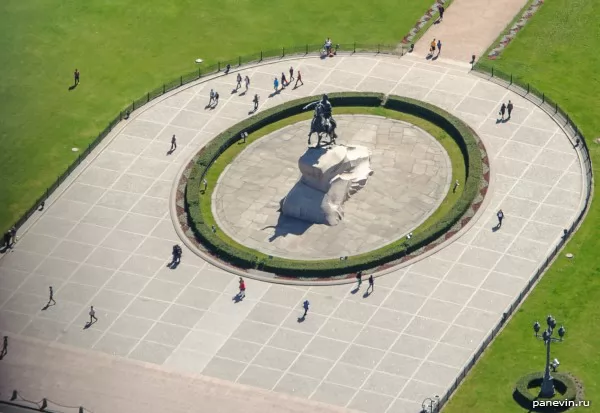
The third is a monument to Suvorov between the Field of Mars and the Neva.
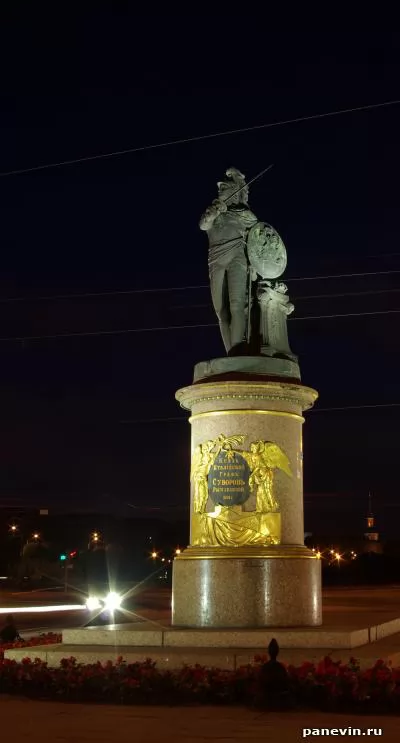
The famous commander looks like an ancient Roman warrior in defiance of the fashionable directions in the sculpture of that time. On a high pedestal of pink granite, a bronze gilded shield is supported, supported by figures of Glory (sculptor F. G. Gordeev).
(s / s. M.I. Kozlovsky, architect A.N. Voronikhin).
The project of the monument was approved in December 1799 and inaugurated on May 5, 1801, on the anniversary of the death of Suvorov.
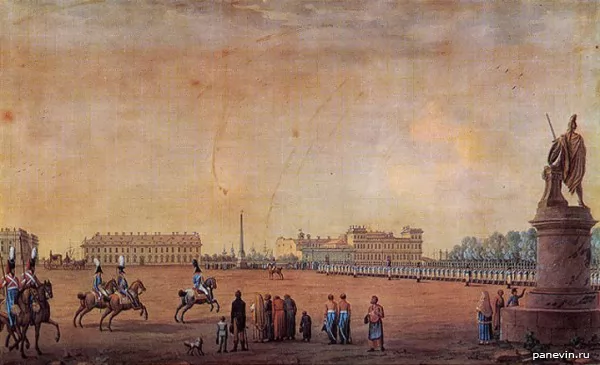
On this engraving by Peterson, the monument to Suvorov and the Rumyantsev Obelisk are still in their original places on the Field of Mars.
Karl Rossi proposed to transfer the Rumyantsev Obelisk to Vasilyevsky Island, and Suvorov - closer to the Neva. Evil tongues immediately invented a genius:
“Do not brag, sir, you are your guard parade,
Suvorov does not look, turning his back".
The Field of Mars before the revolution was called the Sahara, due to the fact that it was regularly used for troop reviews.
During the Great Patriotic War, the generalissimo, like the generals in front of the Kazan Cathedral (Kutuzov and Barclay de Tolly), stood the whole blockade and the Leningraders believed that until these monuments were intact, the city would not be surrendered.

Monument to Peter I in front of the Engineering Castle. The inscription on the pedestal: Great-grandfather Great-grandson. The only equestrian statue in the Baroque style in the city (and, perhaps, in Russia). On the sides of the pedestal are the two most significant Peter's victories - Gangut and Poltava.
The model of the monument was made by the sculptor B.K. Rastrelli during the life of Peter I, however, its casting was completed only in 1745 - 1747. The monument was erected only after half a century - in 1800, which is why such an inscription on the pedestal.
The second is also in honor of Peter I and everyone knows him. This is the “Bronze Horseman” (the poetic name coined by Pushkin).

The monument to Peter I on Senate Square was erected by decree of Catherine II. Sculptors E.-M. Falcone, M.-A. Collot, F. G. Gordeev; architect J. M. Felten. 1768 - 1782 years. In the Patriotic War of 1812, the idea of evacuating the monument was considered due to fears of the capture of the city. There is a legend that this horseman came to Emperor Alexander I in a dream and asked: “What have you brought my Russia to?” Alexander rejected the idea of evacuating the monument and valuables from St. Petersburg.

The third is a monument to Suvorov between the Field of Mars and the Neva.

The famous commander looks like an ancient Roman warrior in defiance of the fashionable directions in the sculpture of that time. On a high pedestal of pink granite, a bronze gilded shield is supported, supported by figures of Glory (sculptor F. G. Gordeev).
(s / s. M.I. Kozlovsky, architect A.N. Voronikhin).
The project of the monument was approved in December 1799 and inaugurated on May 5, 1801, on the anniversary of the death of Suvorov.

On this engraving by Peterson, the monument to Suvorov and the Rumyantsev Obelisk are still in their original places on the Field of Mars.
Karl Rossi proposed to transfer the Rumyantsev Obelisk to Vasilyevsky Island, and Suvorov - closer to the Neva. Evil tongues immediately invented a genius:
“Do not brag, sir, you are your guard parade,
Suvorov does not look, turning his back".
The Field of Mars before the revolution was called the Sahara, due to the fact that it was regularly used for troop reviews.
During the Great Patriotic War, the generalissimo, like the generals in front of the Kazan Cathedral (Kutuzov and Barclay de Tolly), stood the whole blockade and the Leningraders believed that until these monuments were intact, the city would not be surrendered.
Share:
Themes: attractions 134 monuments 72 photos 417 sculpture 71 St.-Petersburg 119
Ticket sales through JetRadar.com service without commissions and markups.
← Blog
samie_pervie_pamyatniki_sankt-peterburga
blog










